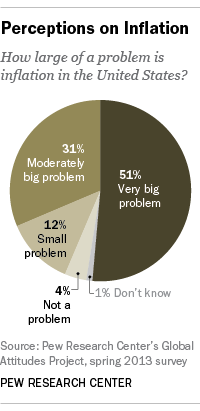 When the Consumer Price Index for July is released later this morning, it’s likely to show a fairly modest increase: 0.2% is the consensus forecast among Wall Street economists, according to Bloomberg News. Inflation has been running at or below an annual rate of 2% for most of the past year — quite low by recent standards.
When the Consumer Price Index for July is released later this morning, it’s likely to show a fairly modest increase: 0.2% is the consensus forecast among Wall Street economists, according to Bloomberg News. Inflation has been running at or below an annual rate of 2% for most of the past year — quite low by recent standards.
Nonetheless, about half (51%) of Americans called rising prices a “very big problem” in this spring’s 39-nation survey by the Pew Research Center. Nearly a third more (31%) said inflation was a “moderately” big problem. Concern about rising prices was particularly acute among people making less than $30,000 a year (59% of that group called it a “very big” problem), people with no college education (60%) and African Americans (61%).
Those findings wouldn’t surprise economists, who’ve known for years that, to quote one recent paper, “average perceptions of inflation are too high, and perceptions tend to be higher for young people, women, unmarried individuals, minorities, and lower-income individuals.” In general, people trust their own experiences more than anything economists might say: When the researchers cited above conducted a simulated shopping experiment, they found that consumers’ inflation perceptions were “systematically biased toward the perceived inflation rates of the [most] frequently purchased items.”
Around the world, people express high levels of concern about rising prices, regardless of the actual level of inflation their national economies may be experiencing. That was true of every one of the 39 publics surveyed this spring: The percentage saying rising prices were a “very” or “moderately” big problem in their countries ranged from 73% in Germany to 100% in Pakistan, Greece and Lebanon.



